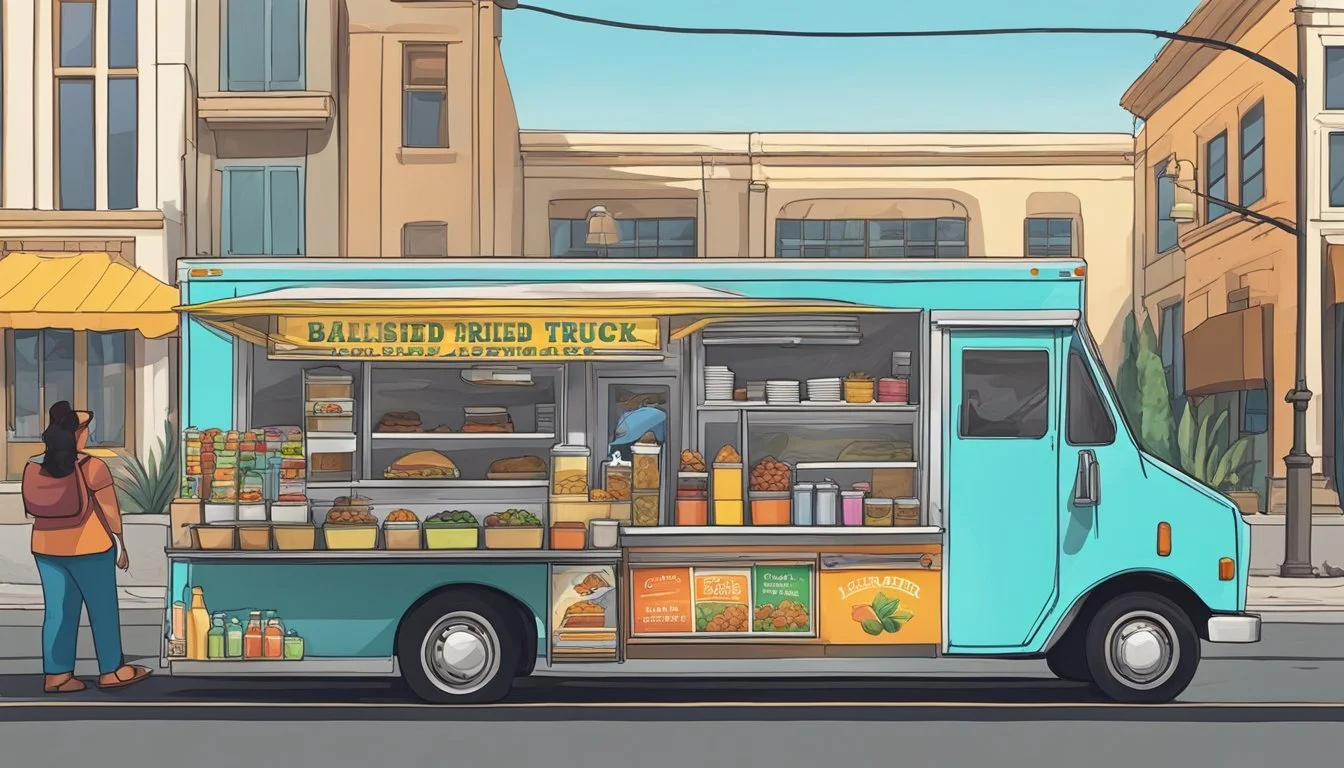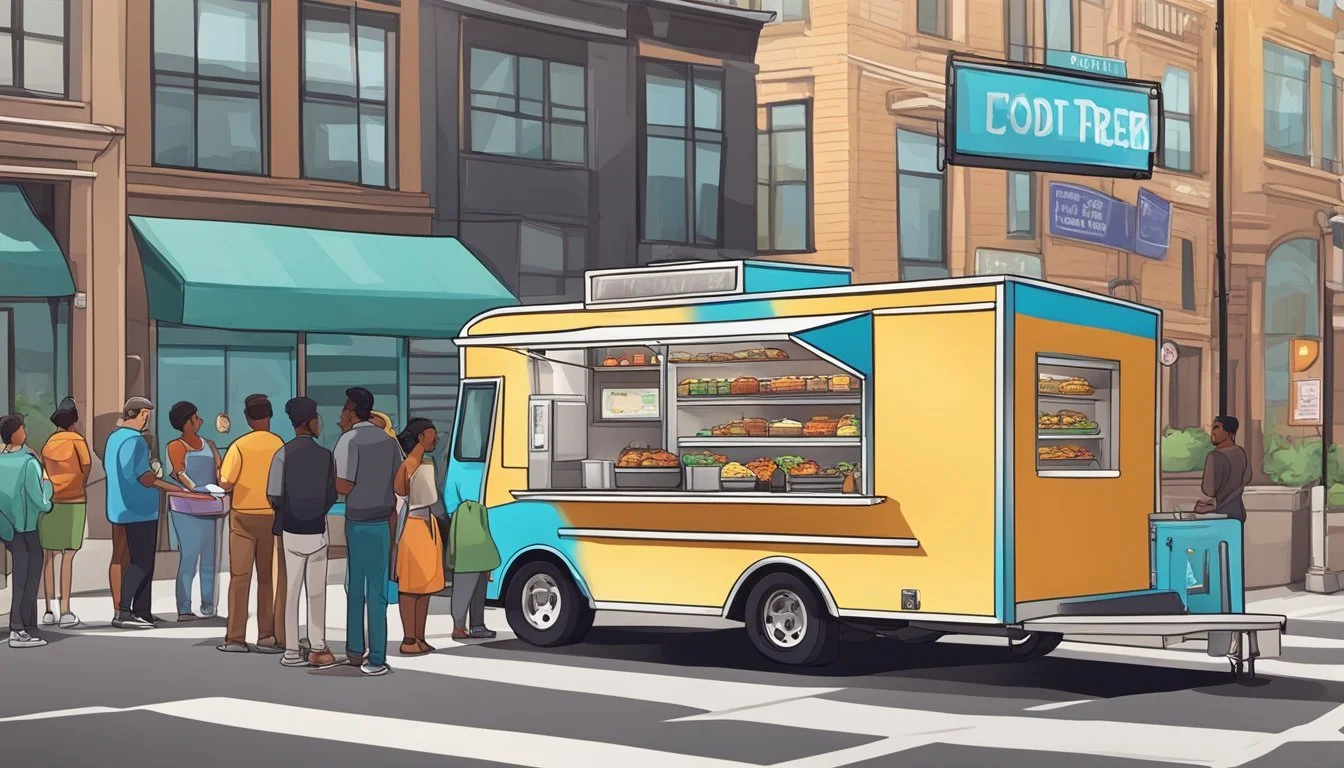Food Truck Laws Bakersfield, California
Navigating Regulations for Street Vendors
The food truck business in Bakersfield, California, has undergone significant changes due to new legislation aimed at streamlining the mobile food vending experience. The Bakersfield City Council recognized the growing popularity of food trucks and the need for modern regulations to protect public health while supporting local entrepreneurs. As a result, they passed an ordinance that not only simplifies the permitting process for food truck operators but also accommodates community enjoyment by allowing for outdoor seating areas.
In an effort to facilitate a vibrant street food culture, Bakersfield’s legal framework has had to balance the interests of stationary businesses with the dynamism of mobile food services. The ordinance provides clear definitions for different types of food vending vehicles, from ice cream trucks to full mobile food preparation units, ensuring that all entities are operating under fair and consistent regulations. This legal clarity benefits both food truck owners who seek to comply with local laws and patrons who enjoy the diverse culinary offerings.
By addressing necessary permits and operational regulations, the city council has made a considerable move towards supporting small business owners and contributing to the city's economic diversity. The ordinance reflects California’s broader approach to street food vendors, aiming to reduce bureaucratic hurdles while maintaining public health and safety standards. These measures indicate a positive step for the food truck industry in Bakersfield, signaling a willingness to embrace innovative dining experiences while fostering a safe and regulated environment for all.
Understanding Food Truck Laws in Bakersfield
Food trucks in Bakersfield are subject to specific local regulations to ensure safe and fair operations. These laws are designed to protect public health and to establish a level playing field for mobile food vendors. Operators must navigate a series of legal requirements to run a food truck legally within city limits.
Key Regulations and Compliance
In Bakersfield, food truck operators are required to comply with a range of regulations set forth by the Bakersfield City Council. A recent ordinance passed by the council aims to streamline the permitting process for mobile food facilities. This includes defining clear standards for operations, parking, and sales. Additionally, vendors must adhere to Kern County's local laws which are integral to maintaining a legitimate food truck business.
Health and Safety Requirements
Ensuring the health and safety of patrons is paramount. The Kern County Public Health department oversees the enforcement of food safety regulations, which includes routine inspections of food trucks. These inspections are to certify that food preparation and storage practices meet the necessary health codes. Trucks must have proper sanitation stations and adhere to temperature controls to reduce the risk of foodborne illnesses.
Mobile Food Facility Permit Process
To operate a food truck, a Mobile Food Facility (MFF) permit is indispensable. The permit process involves submitting an application to the appropriate local authorities, which in Bakersfield is overseen by a city council committee. The permitting process is put in place to verify that food truck operators have solidified their adherence to all relevant food truck laws and regulations before hitting the streets. Documentation will include the inspection approvals, proof of insurance, and a detailed operations plan.
Setting Up Your Food Truck Business
When setting up a food truck business in Bakersfield, California, entrepreneurs should pay close attention to meticulous planning and adherence to local regulations. From crafting a comprehensive business plan to obtaining the necessary licenses, each step is crucial for a successful launch.
Creating a Business Plan
A well-structured business plan serves as the blueprint for a food truck's operations. It should detail the food truck's concept, financial projections, and strategies for growth. For food trucks in Bakersfield, market research is key to understand the local customer base and competition.
Selecting a Business Structure
Choosing the right business structure is imperative. Many food truck owners opt for a Limited Liability Company (LLC) due to its liability protection and tax benefits. Forming an LLC in California requires registration with the state, which includes filing Articles of Organization and paying the associated fee.
Naming Your Food Truck
The name of a food truck is a critical aspect of its brand identity. It should be catchy, reflective of the food and concept, and must comply with California's business name regulations. Prospective owners should ensure the name is unique and not already in use or trademarked by another business.
Developing Your Menu
An appealing menu sets a food truck apart and satisfies the palate of its clientele. Menus should capitalize on unique recipes and flavors that appeal to Bakersfield's diverse population. It's vital to source ingredients judiciously to balance quality with cost-efficiency.
Acquiring Necessary Licenses and Permits
Securing the appropriate licenses and permits is legally required to operate a food truck in Bakersfield. This includes obtaining a business license, a health department permit, and possibly a seller's permit. Food truck owners must keep abreast of state and city-specific regulations to maintain compliance.
Operational Basics for Food Trucks
Food truck operators in Bakersfield, California must navigate a range of regulations that govern where they can do business, when they can operate, and how they should interact with health authorities and the community. Adherence to these regulations ensures the successful and legal operation of a food truck.
Choosing Your Location
The City of Bakersfield permits food trucks to operate in designated locations. Food truck operators should be strategic and deliberate in selecting spots, factoring in foot traffic, proximity to other businesses, and the interests of the target demographic. Researching the most vibrant locations can prove crucial to the truck's success.
Parking and Hours of Operation
Restrictions on parking are essential for all Bakersfield food trucks. Operators must adhere to specific parking regulations enforced within city limits to avoid penalties. Additionally, food trucks have allocated hours within which they can operate, which helps maintain a balance between the needs of stationary businesses and mobile vendors.
Inspection and Health Department Interaction
Frequent interaction with the Kern County Health Department is necessary to maintain the required public health permit. The food truck and its operations will undergo routine inspections to ensure adherence to food safety regulations, which are mandatory for continued operation.
Marketing and Community Engagement
Effective marketing strategies are critical for food truck visibility and attracting customers. Utilizing social media platforms can greatly boost a food truck's profile. Moreover, positive engagement with the Bakersfield community can foster lasting relationships and customer loyalty. Food trucks often participate in community events to increase their reach and reputation.
Food Truck Permits and Licenses
Operating a food truck in Bakersfield, California, necessitates navigating through several permits and licenses to ensure compliance with local and state regulations. Ensuring these requirements are met is paramount for the legal and safe operation of mobile food vending businesses.
Health Permit
Every food truck operating in Bakersfield must secure a Health Permit from the Kern County Public Health Services Department. This permit confirms that the food truck meets all the health and safety standards mandated by the county. The process involves an inspection that focuses on food handling, storage, and preparation practices. To initiate this process, the food truck owner can visit the Kern County Public Health website for detailed information.
Fire Department Certifications
Safety extends beyond food hygiene, and that's where Fire Department Certifications come into play. Food trucks must be inspected and certified by the Bakersfield Fire Department. This certification ensures that all cooking equipment is installed properly and complies with fire safety standards. Mobile food vendors should prepare for evaluations of fire suppression systems and the safe use of propane and electrical setups.
Special State-Required Licenses
In some instances, food trucks might need to obtain special state-required licenses. For example, if they plan to sell items classified under state-approved food lists, such as certain types of shellfish or dairy products. Food truck owners can utilize resources like CalGold, which provide assistance in identifying any additional state-specific licenses required for mobile food vendors in California.
Maintaining Food Truck Compliance
In Bakersfield, California, food truck operators must adhere to specific regulations to maintain compliance. Following these guidelines ensures that food trucks can continue to serve the community safely and legally.
Regular Health Inspections
Food trucks in Bakersfield are subject to routine health inspections by the Kern County Public Health department to ensure they uphold high standards of hygiene and food safety. Operators are required to comply with these inspections annually, a requirement to maintain an active health permit. During these evaluations, inspectors assess the cleanliness of the food truck, the proper handling and storage of ingredients, and adherence to food safety protocols.
Renewing Permits and Ensuring Food Safety
Staying operational involves renewing permits regularly. In Bakersfield, food truck permits are a vital aspect of legal compliance, with prices varying based on the scope of services offered. A crucial part of the permitting process is demonstrating food safety knowledge, either by showing a food safety certification or passing a safety test administered by the health department.
To renew their permit, food truck operators must ensure no violations of local ordinance, state, or federal law have occurred and there have been no disruptions to public peace. Successful renewal is predicated on the continuous observation of these conditions throughout the year.
Additional Considerations for Food Truck Owners
In Bakersfield, food truck owners must navigate a competitive landscape and adhere to specific regulations to operate successfully. It's essential to manage inventory efficiently, deal with competition from brick-and-mortar restaurants, and understand zoning laws that dictate where they can do business.
Dealing with Brick-and-Mortar Restaurant Competition
Food truck operators in Bakersfield often face competition from established brick-and-mortar restaurants, especially in the downtown area. They should focus on distinct menu offerings that differentiate them from traditional restaurants. Food truck owners are advised to collaborate with local businesses through events or partnerships to create a mutually beneficial environment.
Managing Inventory and Packaging
Efficient inventory management is vital to reduce waste and increase profitability. Owners should track inventory levels closely to ensure they have enough supplies to meet demand without overstocking. Sustainable and cost-effective packaging solutions are not only appreciated by consumers but can also be a marketing point to stand out in the Bakersfield food truck scene.
Understanding Zoning and Restrictions
Bakersfield's food truck regulations include zoning laws and restrictions that may vary by zip code. Truck owners must be aware of where they're allowed to operate, particularly avoiding restricted zones in the downtown area. Adherence to these laws is crucial to avoid fines and maintain good standing with local authorities.
To operate a food truck in the competitive and vibrantly diverse culinary market of Bakersfield, California, one needs to be well-informed and strategically savvy. Reviewing Bakersfield's food truck ordinance can provide essential insights for a smooth operation.
Final Thoughts
In Bakersfield, California, the evolving landscape of food truck regulations reflects a balance between health and safety considerations and the growth of the mobile food business. Recent legislation emphasizes simplifying the permitting process, which aids vendors and consumers alike.
The passage of a new law supports street food vendors by easing regulatory hurdles. This aligns with research demonstrating the need for a more accessible approach to mobile food commerce, while still upholding essential public health standards.
Regulations are crafted to ensure that food trucks, whether offering prepackaged food or freshly prepared meals, maintain high safety and sanitation standards. Consistent inspections and permits ensure that food truck operators are accountable for public health.
The concept of food trucks as a staple in urban settings promotes culinary diversity and convenience. They serve as a catalytic force for vibrant street life and local economies. The locations where these mobile eateries operate are often well integrated into community events and cityscapes, yet they remain subject to local zoning laws.
This proactive legislative environment in Bakersfield enables food trucks to thrive as part of the city's flourishing gastronomic scene. Through diligent research and consistent policy updates, Bakersfield showcases a commitment to nurturing the intersection of entrepreneurship, public health, and community engagement.









